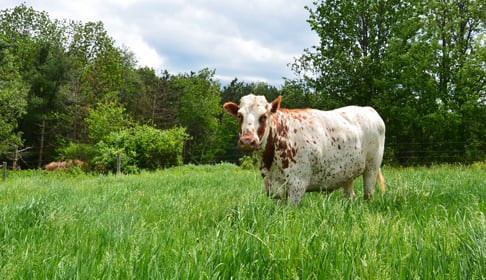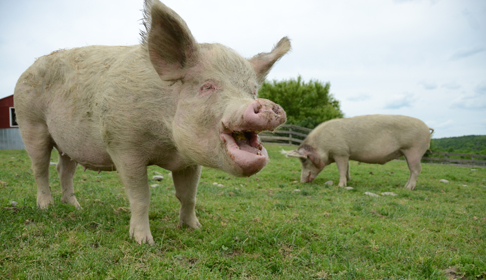By Bruce Friedrich, Director of Policy and Advocacy
People have become increasingly aware that virtually all of the 9 billion land animals slaughtered in the United States each year for their meat are terribly mistreated. In fact, routine farming practices are so abusive that they would warrant felony animal cruelty charges if they were done to cats or dogs.

As a result, more and more compassionate people have joined the ranks of those who choose to eat a vegan diet. Some, however, have looked instead to meat from animals treated less badly, which is often stamped with a “humane certified,” or other such label, and may be referred to as “humane meat.”
This raises two questions in my mind. First, is there such a thing as truly “humane meat”? And second, even if we agree that some meat involves better conditions than conventional meat, should animal advocates promote it? I will address both questions in turn.
Is there such a thing as humane meat?
Let’s pose a question: Would you be willing to eat “humanely raised dog meat” or “humanely raised cat meat”?
I suspect not, and yet there is no rational difference between eating a dog or a pig, a cat or a chicken. All of these species are made of flesh, blood, and bone. And they have interests and personalities, as everyone who has spent time at Farm Sanctuary knows so well.
In fact, scientists have shown that pigs and chickens outperform dogs and cats on scientific tests of behavioral and cognitive sophistication. For the same reason that there is no such thing as humane dog meat, there is also no such thing as humane chicken, pork, or beef. Simply put, killing an animal in order to eat her cannot be called humane.
Let’s pose a second question: Would you be willing to cut an animal’s throat? For most of us, taking an animal’s life is abhorrent; we just wouldn’t do it. Of course, all of us could spend an afternoon participating in every aspect of getting plants to the table — picking them, packaging them, etc. But there is no aspect of slaughtering animals that is similarly pleasant, no aspect that any of us would enjoy doing.

If you’re like most people, you would not slice open a chicken’s throat for something as inconsequential as a meal. But this is precisely what we’re doing if we’re eating meat. Although we’re not personally killing the animal, we are paying someone to do it for us. And if we wouldn’t do it ourselves — if we wouldn’t even want to watch it — we should ask ourselves, where is the basic integrity in paying someone to do something we are opposed to?
Should animal advocates promote “humane meat”?
We should also understand that our decisions can have a strong impact on other people, and our decision to eat any meat at all (even if the meat is from producers that are less abusive) may influence others to eat factory farmed meat.
I’ve been a vegan for 27 years, and, in that time, I’ve convinced many friends and acquaintances to follow my lead. Each one of these individuals saves just as many animals through their veganism as I do through mine. Every person I convince to choose a plant-based diet increases my lifetime impact as a vegan.
But the reverse is also true: By not advocating veganism, all of those animals who could have been saved will instead suffer terrible lives and die horrible deaths.
Most people observing someone eating “humane” meat simply see a fellow meat-eater. They are not likely to change their own diets, because what they see is simply meat. Beyond that, eating “humane” meat is far more difficult than eating a vegan diet. Every restaurant in the country has something for vegans to eat, and it’s almost always cheaper than the meat-based alternatives. The vast majority of cities don’t have even a single restaurant that serves meat from animals who have not been factory farmed.
Obviously, working for improved living and dying conditions for farmed animals is a critical element in the animal rights movement. We should be fighting to ban gestation crates and battery cages. We should be working to ensure that the Humane Slaughter Act is properly enforced. The vast majority of Americans explicitly support banning abusive systems and decreasing abuse at slaughter, and we should strive to align our laws with our national values.
It’s important for the animals involved that we take steps toward ending the cruelty they endure every day. We cannot ignore the animals who are currently suffering.
But for anyone who truly cares about animals, veganism is the only choice that aligns our values — our opposition to cruelty and killing — with our actions.
It’s not that much to ask, and lives are depending on us.



The problem is that we have a history of meat eating and it’s going to be (let’s be real here) a VERY long time before everyone chooses to stop eating it. If ever. In the meantime, I think that YES we should advocate “humane” meat, as ridiculous as it may sound. At least we can make sure these animals live real lives and are killed instantly and painlessly, without ever knowing the difference. YES Advocate veganism, but for the rest…until we get there.
Hey there, I am one of those people who eats “humane” meat. I know exactly what the animals are fed and how they live. My brother (carnivore) has chickens in the yard who get to play with my nieces and nephews (who are vegetarian) and are fed an organic diet and live happy lives. I am very much aware that they have died to feed me and my family and I give thanks every time I sit down to eat.
I think people should become more aware of where their food comes from and how it’s raised, be it vegetables or animals. I don’t think making everyone a vegan or vegetarian is the answer either. You see, we are all different. We all have very different constitutions, which means not all of us will react the same by going on a vegan/vegetarian diet. I did try a vegetarian lifestyle some years ago however it did not agree with me at all. When people see me eating meat, they know where it’s from because I tell them. I make sure to let everyone know why humane meat is better and safer than conventionally raised meat. In the end, I think it’s better to look at all options and see which ones work best for you and your body. If you’re OK becoming a vegan, that’s fantastic. If you’re OK with vegetarianism, that’s OK. If you want to eat meat, that’s OK too but just make sure the food you choose comes from a sustainable, traditionally raised source.
Well said. I do believe that many people are disconnected from their food and it is important to know how our food is raised and grown. I think that if it was customary in America to eat dogs or cats that people would do it. There are humane ways of treating animals and killing them. I do think that people eat too much meat, which in turn gives corporations the opportunity to give factory farming a good name. Instead of trying to meet the demands of the consumer, the consumer needs to cut down their consumption. I do eat meat and I know where it comes from and how it is raised. I think that it is important to educate consumers not only of the conditions that the majority of our meat is coming from but of our agricultural system as well.
I don’t think people “don’t want to know” how the factory farms treat animals for slaughter – I think we are only starting to know now because of the internet, so keep spreading the word and exposing factory farms and the cruelty. Most people, I hope, would be horrified to know these things. I always just assumed the animals were treated decently and never knew of factory farming. Disgusting and horrifying!
The majority of people “tune out” when they feel that they are trying to be converted to vegan or vegetarian. That is the reality. In our lifetimes, the most we can do in my opinion is to try and change the lives of factory farmed animals, and encourage the general public to end factory farming. While you may be able to convert a few folks to become vegan, it won’t change the lives of many animals. If you could work on changing the conditions of animals, people will have a much more open mind and perhaps big changes could occur for the poor, poor animals living in massive farming operations. I’ve had countless discussions about this over a decade, and preaching vegan or vegetarian is pretty much a waste of time – explaining the difference between humanely raised animals vs tortured animals will have more impact and give people more options. Just my opinion.
I wish you would not suggest that cats can be vegetarian. I hope people don’t believe this and start eliminating meat from their cats diet, or they will have very sick cats – they do not thrive on a vegetarian diet – plain and simple:)
Veganism is clearly the most ethical choice but, as a previous commenter has noted, we are a VERY long way from that diet being universally adopted. Meanwhile, factory farming is a four-alarm fire that needs to be stopped presto. It is trashing the environment, involves unspeakable cruelty to billions of living souls, and impacts human health through antibiotic-soaked meat. It’s true that every restaurant has a vegan dish but that dish may well be french fries, not quinoa with nuts and vegetables. I believe that veganism can be healthy and flavorful if you know what you’re doing and have the skill to put together tasty, nutritional meals. Most people do not yet have the time or inclination to do so. But if we concentrate on bringing about the end of factory farming, meat and animal products will become so expensive that people will naturally turn to other forms of protein. Then meat will revert to what it has been throughout most of human history: a condiment for seasoning other dishes and a special treat for holidays. Just looking at the vast numbers of animals saved from horrible deaths, that outcome would be a huge victory for the animal rights movement.
Well said!!
Pingback: Not-so-humane meat | Louise Spiteri